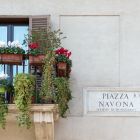Interview with John Cabot's President, Franco Pavoncello
This autumn marks the half-centenary of John Cabot University of Rome. We sat down with the university’s president, Franco Pavoncello, to discuss the university’s achievements, his vision for the future, the difficulties of keeping students safe, as well as a potential move into politics.
In the autumn of 1972, the president of Hiram College, Ohio, which served as a university of records for John Cabot University for many years, reported back to his faculty that “the John Cabot International College, has opened its doors in Rome to thirty-one students - eleven more than expected.”
Fifty years later, John Cabot University (JCU) would probably still exceed the expectations of its early benefactors. Each year, it attracts thousands of students from over 70 countries, including a sizable number of Italians, who come to benefit from an American-style liberal arts education while enjoying the cultural heritage and charm of Rome.
Sitting in his luminous on-campus office overlooking the Tiber, the current president, Professor Franco Pavoncello, is upbeat. Not only is the university at a record level of attendance this autumn, but he has also just spent the last few weeks celebrating JCU’s half-centenary with a series of academic conferences, concerts and even a gala at Hotel Hassler. “It is definitely a moment of great activity and ebullience at an academic level here,” Pavoncello said.
It hasn’t always been smooth sailing.
In spring of 2021, as the pandemic spread across Europe, only 12, of an expected 500 international students enrolled at JCU. Pavoncello said it was one of the most difficult moments of his career. But the university pulled through.
Today, JCU’s three campuses - which are buried within the frenzied but alluring streets of Trastevere - are brimming with students. The university’s academic programme is also bigger than ever, with 14 majors (courses of study) offering specialisations in anything from business administration, to psychology, and English literature, as well as an MA in Art History.
Studying in Rome, especially its fashionable Trastevere district, becomes the realisation of a dream for many US and international students from the moment they set foot in the city. But for Pavoncello, the advantages of international education in the age of globalisation are conspicuous.
Before joining JCU in the mid-1990s, Pavoncello pursued a successful academic career abroad, which included working in Cambridge [at Harvard University] with the great political scientist Robert D. Putnam, collaborating with him on his work on societal decline and social capital. He had stints at the University of Jerusalem, the University of Michigan.
These experiences informed Pavoncello's vision for student life at John Cabot:
“I learnt from my time in Israel and the United States that when you interact in a global environment as a foreigner in a different culture, you understand much better who you are. You understand what your traditions are, you understand the universal and peculiar parts of your culture. The experience can be transformative,” he said.
Though JCU opened initially in the northern outskirts of Rome, and only moved to Via della Lungara on the grounds of Villa Farnesina, in the 1990s, Trastevere is central to the university’s modern identity.
Students here dive in and out of classrooms to the clanging bells of the neighbourhood’s baroque churches and take coffee breaks in the surrounding elegant piazzas. The location has particular significance for Pavoncello. Despite his many years abroad, his ties with the area run deep.
He was born to a Roman Jewish family - in the same room where his great-grandfather was taken by the Nazis during world war two. Later, he moved across the river to Trastevere, where his mother’s side of his family has lived for 100 years. He spent his childhood exploring the very same street where JCU is now happily ensconced.
Pavoncello likes to believe the university has helped transform the area. It is true that in the last decades, Trastevere has changed from a neighbourhood of workers and labourers to a bustling hive of culture, packed full of cafes, theatres and cinemas. “JCU has been an economic dynamo for the neighbourhood,” he says.
Nevertheless, recently the gentrifying neighbourhood has come under criticism for being overrun with restaurants and late-night bars that have muscled out artisans and family businesses. The encroachment of tourists, as well as riotous behaviour of evening party-goers at night, has angered residents. Some have pointed their fingers at the American university. Pavoncello is categorical that the troubles have little to do with JCU. He suggests the American institution might attract a disproportionate amount of media attention.
With an increasing demand for study abroad programmes and undergraduates wanting to enrol in foreign colleges for a complete bachelor’s degree, John Cabot is likely to continue to attract more and more students through its doors. Wanted in Rome spoke to Pavoncello about all of this, the university's half-centenary and his plans for the future.
When John Cabot was founded in 1972, Italy was going through some troubled times politically. Richard Nixon was still president in the US. It was also the year of Watergate. What were the motivations behind creating an American university in Rome?
The idea of having an international university in Europe, wasn’t the most normal thing at the time. In Europe, universities are very much the product of national ideas and national traditions. But the spirit of JCU has always been to put an international horizon in the minds of students.The college was named after 15th-century Italian explorer Giovanni Caboto, probably from Gaeta, who helped discover North America under the flag of Henry VII and who is largely responsible for English being spoken on the continent.
Our mission is therefore to educate young leaders who can make a change in the world. Most importantly, we want them to understand and have empathy for the society around them.
John Cabot embodies the liberal arts college tradition, how important is this for the university?
Well actually, the university started life as a business school but we eventuall became a fully fledged accredited liberal arts university. Since then, the humanistic component of our education has been crucial to our culture. We have always encouraged open debate and constant dialogue between professors and students.There has always been this sense that everyone is allowed to think and to express and to be who they are.
This means even those studying business administration, for example, are exposed to liberal arts ideas, to critical thinking, to elegant expression, to understanding the world around us.
Today, 40 per cent of JCU’s degree seeking students are Italian. What advantages can Italian students get from enrolling here as opposed to the number of high quality, and considerably cheaper, public universities in Rome?
There are several things. First, students here are in an international environment and, as we discussed before, will study in the American liberal arts tradition. This is a very structured programme, where you have to perform to a certain level and you can’t be parked and left behind.Second, we have a holistic conception of the university, where students learn to dedicate themselves to the community, to be leaders, and to develop different skills beyond academics.
Third, Italians students will come out speaking and writing excellent English which is still rare in Italy today. Next year, we are launching an Italian Development Initiative that will give fee discounts to Italian students. We feel it is extremely important to encourage the Italian component of the university.
What does Rome give students coming from abroad?
Rome gives them everything. It's a bird's eye view of history - or at least 2,000 years of it. We offer the possibility of coming into a non-familiar environment but to do so in a familiar context. I believe this makes you understand the differences better as you have the tools of an American university to explore a new culture.The Trastevere district used to be a working-class area. Then it also became a place of culture with cinemas, theatres and bookshops. What significance does the district have for the university?
The location is extremely important to us. Trastevere has always been a centre of learning and culture. My mother was born in Trastevere and her family has been here for 100 years. It’s lively and very multifaceted. I believe JCU has played a role in making it more active and richer.Recently, La Repubblica newspaper has run a series of articles on the safety of Trastevere, pointing to a number of cases of sexual assault of which JCU’s students were victims. What reassurance can you say to those who might be worried about the safety of moving to Rome to attend the university?
The safety of our students is JCU’s foremost priority. We work very hard to to ensure our students’ safety . Despite the fact that we are extremely vigilant around our campus, Rome is a major European capital and it has all the challenges that other major European cities have. That said, we take safety extremely seriously and we do all we can.What about JCU in the next 50 years?
I was asked the same question by our Board of Trustees recently. I am closer to the end than beginning of my presidency but my idea is to continue to push for an increase in students and further expand our majors programmes.The accreditation of our Business School, from the Association to Advance Collegiate Schools of Business (AACSB) - only the third in Italy to do so – has been a great success. We will build on this by launching our new Master in International Affairs.
There are lots of exciting possibilities. Maybe my successor might even explore the possibility of an American-style campus outside of Rome.
You regularly appear as an expert voice on Italian politics for news outlets, how did you begin your career as a pundit?
Silvio Berlusconi is responsible for my career as a pundit, I think. [Laughs]Now I do much less. For a period, I was doing programmes with CNN, BBC and Bloomberg. Once I was giving an interview live when the Berlusconi government collapsed and I suggested that the former EU Commissioner Mario Monti, could step in as a potential caretaker. From then they kept on calling me back - I think they thought I was a wizard or had access to some form of insider information.
Monti was president of Bocconi University in Milan for many years, before leading Italy’s technocratic government in 2011. With Italian politics you never know what is around the corner, would you ever consider doing something similar if the opportunity arises?
[Laughs] No one has ever considered asking me such a thing. I think I am very well engaged in the university. People should know what they do well and what their limitations are.By Charles Seymour
General Info
View on Map
Interview with John Cabot's President, Franco Pavoncello
Via della Lungara, 233, 00165 Roma RM, Italia



















